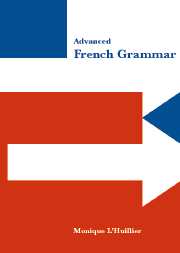Book contents
- Frontmatter
- Contents
- Acknowledgements
- Introduction
- 1 Framework
- 2 Verbs
- 4 Introduction to verbs
- 5 Present indicative
- 6 depuis and other tense markers
- 7 Future
- 8 Imperfect
- 9 Perfect
- 10 Past historic
- 11 Other past tenses
- 12 Subjunctive
- 13 Conditional and the expression of hypothesis
- 14 Imperative
- 15 Infinitive
- 16 Present participle
- 17 Past participle
- 18 Active and passive voices
- 19 Impersonal verbs and the impersonal voice
- 20 Pronominal verbs
- 21 Modals: devoir, pouvoir, vouloir
- 22 savoir and connaître
- 3 Determiners and prepositions
- 4 Nouns, pronouns and modifiers
- 5 Sentences and text
- Appendixes
- Bibliography
- Index
16 - Present participle
Published online by Cambridge University Press: 05 June 2012
- Frontmatter
- Contents
- Acknowledgements
- Introduction
- 1 Framework
- 2 Verbs
- 4 Introduction to verbs
- 5 Present indicative
- 6 depuis and other tense markers
- 7 Future
- 8 Imperfect
- 9 Perfect
- 10 Past historic
- 11 Other past tenses
- 12 Subjunctive
- 13 Conditional and the expression of hypothesis
- 14 Imperative
- 15 Infinitive
- 16 Present participle
- 17 Past participle
- 18 Active and passive voices
- 19 Impersonal verbs and the impersonal voice
- 20 Pronominal verbs
- 21 Modals: devoir, pouvoir, vouloir
- 22 savoir and connaître
- 3 Determiners and prepositions
- 4 Nouns, pronouns and modifiers
- 5 Sentences and text
- Appendixes
- Bibliography
- Index
Summary
Introduction
The present participle is one of the non-personal moods of the verb. From a syntactic point of view, it is the adjectival form of the verb. However, like a verb, it can also have a complement and it thus has a dual nature as a verb and an adjective. Similarly the gerund (see 3.3 below) is both a verb and an adverb. Furthermore, the present participle can be used as a noun by improper derivation and it can form participial clauses that function like adverbial clauses.
There is no one-to-one correspondence between French and English regarding forms in -ant and forms in ‘-ing’. For instance a French infinitive often translates an English form in ‘-ing’ (see 3.4 below).
Finally, the presence or absence of en is a common source of errors (see 3.2.2.2 below).
Formation
(i) Present participle
The present participle is formed by adding the suffix -ant to the radical of the first person plural in the present indicative.
(ii) Compound form
The compound form or perfect participle is made up of the present participle of être or avoir + the past participle of the verb (see also chapter 17 Past Participle).
Ex: ayant compris; étant parti; s'étant souvenu
(iii) Passive form
The passive form is constructed with transitive verbs, with the present participle of être + the past participle.
Ex: Les vacances étant terminées, il faut reprendre le travail.
Note that the past participle agrees according to the rules given in chapter 9 Perfect, section 3.
- Type
- Chapter
- Information
- Advanced French Grammar , pp. 221 - 233Publisher: Cambridge University PressPrint publication year: 1999



